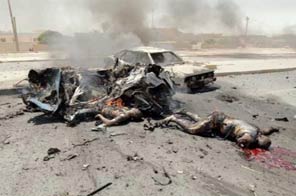47 killed in wave of Iraq bombings
KHAZNAH: Two truck bombs targeting a tiny sect in a village in northern Iraq and a spate of bloody bombings in Baghdad killed at least 47 people on Monday and wounded more than 250, officials said.
In the deadliest single attack, two booby-trapped lorries exploded before dawn in the village of Khaznah, east of the restive northern Iraqi city of Mosul, leaving 28 people dead and 155 wounded.
The massive blasts levelled 35 houses and gouged deep craters into the ground of the prosperous village of 3,000, home to members of the small Shabak community, a sect of Kurdish origin.
Falah Ridha, a 23-year-old nurse wounded in the attack, said he was the only survivor of 12 people in his family home.
"Eleven people in my family were killed when their house collapsed. All of them woke up after the first bomb, but the second bomb was very close to my house, it was like an earthquake," he said.
"No one else escaped, just me."
Mohammed Kadhem, 37, told AFP: "I was sleeping on the roof and I woke up as if there was an earthquake. After that I saw a plume of smoke and dust spreading everywhere.
"A minute later another bomb went off, knocking me off the roof onto the ground. I was struck unconscious by shrapnel and stones," he said.
Another local resident, Assaad Salem, said: "I had just finished my prayers and was trying to sleep when the first bomb went off and destroyed everything in my house, it was like a dust storm.
"Then the other bomb went off and I thought this is doomsday, this is the end of all life."
Mosul has been the frequent target of attacks despite a marked decline in violence elsewhere in the country, and US commanders describe it as the last urban bastion of Al-Qaeda loyalists in Iraq.
The country's second city with a population of about 1.6 million, Mosul is mainly Sunni -- both Arab and Kurdish -- but it also has significant Christian and Shiite Turkmen minorities.
In Baghdad, two bombs went off as day labourers were gathering in the early morning looking for jobs, police and the interior ministry said.
The first bomb, hidden inside a bag of cement, exploded at Hay al-Amel in the west of the capital, killing seven people and injuring 46.
The second attack, a car bomb in Shurta Arbaa in the north of the city, killed nine people and wounded 36 others.
A third bombing at a market in the southern suburb of Saidiyah killed three people and wounded 14.
Prime Minister Nuri al-Maliki at a meeting with army commanders praised efforts in fighting insurgents but said the struggle was ongoing.
"The pursuit is still on and, God willing, we will remove all those corrupted people who willingly and in cold blood kill Iraqis," he said.
On Friday, a powerful car bomb blast killed at least 37 Shiite Muslims near a mosque in Mosul in a wave of attacks that also killed 10 people in Baghdad, threatening to plunge the country into a new round of sectarian conflict.
Despite a reduction in violence in recent months, attacks against security forces and civilians remain common in Baghdad, Mosul and in the ethnically divided northern oil-rich city of Kirkuk.
The number of violent deaths fell by a third last month to 275 from 437 in June, following the pullout of US forces from urban areas.
The figure for May was 155, the lowest of any month since the US-led 2003 invasion.
The Shabak community numbers about 30,000 people living in 35 villages in the province of Nineveh, and many want to become part of the autonomous Kurdish region of northern Iraq.
They speak a distinct language and largely follow a faith that is a blend of Shiite Islam and local beliefs.
The Shabak community was persecuted under ousted Iraqi dictator Saddam Hussein, and after the invasion they were targeted on a number of occasions by Al-Qaeda.






